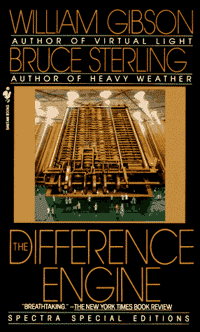
From toothpaw's flickr photostream.
I'm not even joking. Gibson and Sterling throw down this grimace-worthy gem on the 150th page, attributing it to some wholesome, granola-munching Victorian hippies:
"A group of Quakers, men and women, stood on the pavement outside the Palace. They were droning another of their intolerable sermonizing ditties, something about a 'railway to Heaven,' by the sound of it. The song did not seem to have much to do with Evolution, or blasphemy, or fossils; but perhaps the sheer monotony of their bootless protests had exhausted even the Quakers."I always find these sorts of cultural snapshots interesting, but this one in particular because it reminded me of a George Orwell quote: "Socialism [draws toward it] with magnetic force every fruit-juice drinker, nudist, sandal-wearer, sex-maniac, Quaker, 'Nature Cure' quack, pacifist and feminist in England." (from The Road to Wigan Pier, 1936)
Now, I could easily veer this post towards an analysis of the appearances of socialism in The Difference Engine. But I want to dally on the topic of middle-class cranks a bit more. They're all over the place, taking such diverse forms as the exiled Luddite movement and Florence Bartlett's cultish speech about "universal free love." It obviously doesn't take socialism to espouse these sort of contingent theories -- Bartlett also rants about eugenics and selective breeding, and is staunchly anti-drug-use. These ideas veer widely from those of the Pilates-practicing, probiotic-scarfing and antioxidant-guzzling cranks we see today, though they might all share toxin-free living with the Quakers. I find it funny that the one thing such radically different idealists could agree on is a body pure of chemicals and intoxicants. Of course, most agree to the idea without adhering to the lifestyle -- or they mix their fruit-juice drinking with smoking weed and having acid trips.
Faced with my most sensible friends going vegan and gluten-free, and staring into the headlights of an intoxicant-free life myself (I'm getting old, you know), I find that the idea of "body as temple" seems to be attacking me from all angles. An Anglican minister friend recently gave a short sermon about Jesus throwing merchants out of the temple, and likened it to treating your own body as a temple, keeping it pure, and respecting it as holy ground. Her main point was that the Jews forced the Gentiles out of the temple proper, and made them worship on "less holy" ground -- so of course they reacted with disrespect for the church and turned it into a marketplace.
This lesson is interesting to me -- even if something (Gentiles, drugs) seems unhealthy to you, you should let it into your temple/body anyways, but treat it with respect and it will respect you back. I've always been a firm believer in moderation: too much of anything is never healthy, but just the right amount will make you appreciate it all the more. Besides the feel-good moral of "expose yourself to new things, even if you don't think you'll like them," and ignoring the tempting rant about fad diets and incomprehensibly scientific-sounding bodily cures, I want to point out another tired theme: that everything is based on context. Eugenics-happy fascists and free-loving hippies both think drinking is bad, in their own special ways. Why? Are these both the types of people that can't muster up enough self-control to moderate their own behaviour, so they have to eradicate all dangerous substances and experiences entirely? Are these both the types of people to hop on board any trend that comes their way, and do it to excess, even if that excess will kill?
To be honest, I never had any idea what "Stairway to Heaven" was even remotely about. Anyone care to fill me in?




Originally this post was going to be a compendium of stupid lines from the book ("give the insolent rascal another sharp taste of the fist") -- but I'm easily distracted. Maybe I'll do a Top Ten after we finish reading.
ReplyDeleteRE that Orwell quote, I believe there's an almost identical one in Homage to Catalonia; he uses the phenomena to explain why he went off to fight fascists rather than hang about at home with the poser wannabe freaks.
ReplyDeleteThe song being referenced isn't a sly nod to "Stairway to heaven", it is actually a nineteenth century Quaker Hymn called "Life's Railway to Heaven" - you can find the lyrics and music here:
ReplyDeletehttp://library.timelesstruths.org/music/Lifes_Railway_to_Heaven/
I'm wondering why you find the text quoted as "grimace-worthy"... I just don't get what is awkward or offensive about it.
Aww, Bill, way to shatter my illusions! I should have known better than to assume any imagined shred of modern cultural reference might have held up to scrutiny.
ReplyDeleteThat song, the real one, is great - almost forward-thinking. I should rewrite this post as a commentary on Christian music throughout the ages.